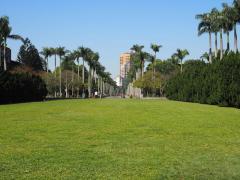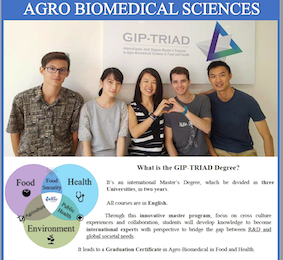
B2AS | Biotechnology, plant, health & food
Agro-BioMedical Science

Agro-BioMedical Science
Context

Many metabolic diseases such as obesity, cardio vascular disease, diabetes, cancers are the greatest public health challenges of the 21st century. Their prevalence has increased dramatically in many countries in Europe as well as in Asia, since the 1980s and the number of them continue to rise at an anomaly rate.
Food & health are two issues central to human existence and they are inseparable in their relationship meaning « food is medicine » and hold the key to realising a « society in much illness is prevented before it occurs.
Food-related health problems and lifestyle-related diseases, threats to food security (food availability at world level), and the increasing cost of medical care are just some of the many challenges society now faces. To face these myriad problems, there is a need for a fusion of agriculture and medical science in order to find solutions for a better society.
Aims of the pathway

The Agro BioMedical Science International Master will provide a unique opportunity to learn in English and follow courses in three outstanding universities:
The common name of the International Joint Degree Master's Programm in Agro-Biomedical Science is GIP-TRIAD. THe stduents can access the offcial GIP-TRIAD web site here.
The Agro BioMedical Science International Master goal is to provide a unique opportunity to cultivate advanced professionals that can bridge R&D with societal needs to overcome global challenges in food and health in an international context.
To achieve this goal, our program allows students to learn not simply by attending lectures but also by taking practical coursework in each country.
The Agro BioMedical Science International Master will provide students with cutting edge research-based training in Plant Science, Biotechnology, Health, Nutrition, Food Production.
The teaching includes the most update advances in Toxicology, Cancer, Drug discovery, Global Health, Applied translational Microbiology, Global Food Security, Animal based Food Stuff, Nutrition, Agriculture, Crop Production, Green Biotechnology, Omics and Bioinformatics Tools.
The Agro BioMedical Science International Master will give the opportunity to follow some important biological question from the field to the laboratory, to work in group interacting with each other in day-to-day activities at the shared university facilities and taking a large varieties of course will help the students to understand the fundamental behind the reality of the working world.
Pathway organization, resources, and training program
The Agro BioMedical Science program is designed for a maximum cohort of 15 students coming from the three partner universities.
The teaching program has been coordinated between the three universities and the Japanese, Taiwanese and French students will follow during two years a rich experience living in Europe and in Asia.
First year, first semester at Tsukuba University (M1 S1 30 ECTS)
The program begins in the fall semester, where students from all three countries first gather at University of Tsukuba, interacting with each other in day-to-day activities at the shared university housing facilities and taking courses that help them understand the fundamentals behind our program.Here, students acquire knowledge about agro-biomedicine at the global level and, through lab internship, study research methodologies in food and health.
In addition, students take coursework in entrepreneurship, learning to foster a so-called “entrepreneurial spirit.”
| Teaching Unit | Mandatory or Elective | ECTS | Language |
|---|---|---|---|
| Introduction of Agro-Biomedical Science | Mandatory | 2 | English |
| Environmental Health Perspective | Mandatory | 4 | English |
| Entrepreneurship Training I | Mandatory | 4 | English |
| Entrepreneurship Training II | Elective | 4 | English |
| English in Medical Science & Technology | Elective | 2 | English |
| Writing Scientific Papers in English | Elective | 2 | English |
| Agro-Biomedical Science Lab. Seminar I | Mandatory | 2 | English |
| Basic Toxicology | Mandatory | 2 | English |
| Critical Path research Management | Elective | 4 | English |
| Cancer Biology | Elective | 4 | English |
| Oncology | Elective | 4 | English |
| Frontier Science in Drug Discovery | Elective | 2 | English |
| Health Care Policy and Management, Health Service Adminsitration | Elective | 4 | English |
| Advanced Course on Global Food Security | Elective | 4 | English |
| Advanced Food SYstem | Elective | 4 | English |
| R&D for Agro-Biomedical Science | Elective | 6 | English |
| Supplementary Japanese | Non credit course | Japanese |
First year, second semester at National Taiwan University (M1 S2, 30 ECTS)
During their second semester, all students relocate together to National Taiwan University.There, they study field- and lab-based subjects that connect the two, leading to the acquisition of GIP-TRIAD’s unique approach to food and health with global perspective and experience.
In addition, students can participate in a corporate internship while in Taiwan for the purpose of gaining a deeper understanding of corporate workings in Asia.
| Teaching Unit | Mandatory or Elective | ECTS | Language |
|---|---|---|---|
| Bio-Entrepreneurship Training | Elective | 4 | English |
| Internship in taiwan I | Elective | 6 | English |
| Agro-BioMedical Science Lab. Seminar II | Elective | 2 | English |
| Fusion of field and Lab. Studies | Elective | 6 | English |
| Biomedical Translation Boot Camp | Elective | 4 | English |
| R&D for Agro-BioMedical Science II | Elective | 4 | English |
| Molecual Nutrition | Elective | 4 | English |
| Applied Translational Microbiology | Elective | 6 | English |
| Biotechnology in Milk Products | Elective | 4 | English |
| Principle and Application in Health Research Methods | Elective | 6 | English |
| Environmental and Occupational Health | Elective | 6 | English |
| Measuring Burden of Disease: Methods and Applications | Elective | 4 | English |
| Cellular Network of Biological Molecules | Mandatory | 4 | English |
| Comtemporary Issues in Global Health | Mandatory | 6 | English |
| Agriculture in Taiwan | Mandatory | 4 | English |
| Chinese Communication | Free elective | 2 | Chinese |
The Second year, First semester at Bordeaux University (M2 S1 30 ECTS)
For their third semester, students relocate to France to attend the University of Bordeaux. By utilizing access France's unique field environments in their coursework, students acquire additional methodologies in food and health through hands-on experience. Simultaneously, students have the opportunity to participate in a corporate internship, where they can learn and experience corporate workings in France.| Teaching Unit | Mandatory or Elective | ECTS | Language |
|---|---|---|---|
| Job & Internship Hunting including technological watch | Mandatory | 3 | English |
| International Scientific Seminars | Mandatory | 3 | English |
| Field to Lab. Practices and Data Managemnt & Data Mining | Mandatory | 3 | English |
| Integrative Unit with Omics & Bioinformatics | Mandatory | 6 | English |
| Water and Food-borne Microbiological Diseases and Dietary Habits in HUman Population | Elective | 3 | English |
| Nutrition, Microbiome and Immunity | Elective | 3 | English |
| Nutrition, Physiological Regulation and Major Human Diseases | Elective | 3 | English |
| Nutrition & Health Organisation in Europe | Elective | 3 | English |
| Impact of Environmental Stresses on Crop Production | Elective | 3 | English |
| Integratiing @ advanced Plant Breediing | Elective | 3 | English |
| Green Biotechnology | Elective | 3 | English |
| Quality of animal-based Foodstuff | Elective | 3 | |
| French Communication | Free elective | 2 |
The Second year, Second semester (M2 S2) WorldwideIinternship
For their final semester, students choose which country to reside in based on where they would like to intern. Students may return Japan or Taiwan, for example, stay in France for an extended internship or find an internship anywhere in the world in academic laboratory as well as private company laboratory. Indeed, the fourth semester is devoted to laboratory practice (6 months, 30 ECTS) in research & development laboratories.


